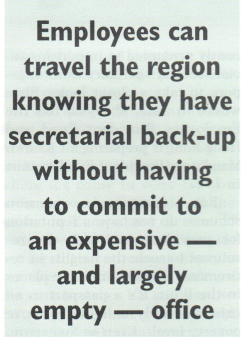A hard day at the office isn’t what it used to be. These days that office can be anything from three floors of a glitzy tower to a single Employees can travel the region desk in a business center or a knowing they have laptop computer on your dining room table.
Not everyone needs a conventional office any more. For companies venturing into Asia, a business center is often a cheaper alternative. Employees can travel the region knowing they have secretarial backup without having to commit to an expensive largely empty office. and
At the same time travel-weary executives and self-employed people are warming to the idea of working from home. This is particularly appealing if you have a wife, husband or other family members to help. For the self-employed, the initial setup bill may be hefty, but not as great as the rent and staff costs saved over time.

Singapore-based Denny Sunanja, manager director of US power company International Telesis, combines the two options. He spends two weeks a month traveling and on his return to Singapore, the confirmed Jeans and T-shirts’ executive works from home.
But while he’s away, a business center provides his company with an address and answers his calls for a monthly charge.
‘Working from home is probably the only way to work nowadays,’ he says. “When I come home after being in the field all the time, it’s nice to work out of your home and still have somebody answering the phone in the office.”
Business centers usually occupy a whole floor of a building. divided into smaller offices of varying sizes and quality. They offer a wide range of services and office infrastructure as well as conference and board rooms for meeting clients.
Companies have the option of either taking office space in a center or simply having their calls answered by a full-time secretary.
‘A lot of people are working from home,” says Tazmin Watson of Hong Kong’s Drake Business Centre. ‘It’s not always cost-effective for companies to have a single office. She says the looming handover of Hong Kong to China in 1997 is also a factor behind some companies taking space in a business center. ‘A lot of people don’t want to commit themselves for another two to three years right now.”
Style Over Substance?
In a region where style often wins out over substance, some companies may feel it important to have their own swish address and glitzy name plaque.
Clearly a home office is unlikely to provide that, particularly if you have children. Space in a business center, on the other hand, can be made to look like a real office, says Watson. ‘A lot of our clients have their name board outside our premises,’ she says.
Sunanja, who deals mainly with governments, says he meets contacts in the boardroom at the business center he uses. When they come into the office they always think it’s my office because they think the receptionist and the people they service are working for me only,’ he says.

‘We are a small company but the business center gives me a prestigious address and the backup I need when I need it.”
But not all companies need a downtown address. Ron Kaufman, director of customized training with Singapore’s Service Quality Centre, has worked at home for 21 years without needing either a city office or a business center.
I’ve been able to set up exactly what I need in a very customized way based out of my home,’ he says. His office takes up two bedrooms and once the door is closed it doesn’t invade the space in the rest of the house.
Image is not as crucial because his business comes from referrals. ‘By the time a client finds out about me they already know who I am. They know what I deliver and they know why they want to come to me.
So our first meeting is at their office and subsequent meetings will be at their office or the location of the training program. Alter- natively you can meet in one of the many clubs in Singapore.”
Weighing the Costs
Setting up a home office can be expensive once you’ve secured the right equipment – computer, fax, printer, photocopier, etc. and secretarial backup. Over time, however, it is likely to work out more cost-effective than a conventional office.
The cost will also depend on how much work you need to get done outside. Kaufman says he might occasionally pay for a desktop publisher, but he doesn’t need to ‘outsource’ his whole office so the costs are not onerous.
Then there are hidden costs. In Asia there’s more potential for a home office to impose on family life or vice versa because living quarters are generally smaller than in say the US or Australia. Many families also have grandparents or other relatives living with them. Kaufman recounts a common joke that if a client rings you at home and hears the kids screaming, you’ll have to drop your rates by half. If you’ve got kids in the background, at that point a serviced office for telephone answering could be very useful,’ he says. Lack of interaction with colleagues or the feeling that you’re cut off from the outside world can also be a drawback, says one home worker.
‘I miss being able to bounce ideas off others,’ she says. She also
admits to suffering the occasional bout of ‘cabin fever’. If you’re busy it’s easy to pass a whole day without going outside. You have to force yourself to take a walk.
Modern technology can alleviate that isolation. With a computer and a modem you can link up to the Internet or send and receive electronic mail to colleagues or friends around the world.
The cost of a business center varies along with your needs. In Hong Kong for example, a 200 square foot space in a prestigious tower with full secretarial services will cost HK$22,000 (US$2,900). That can rise to $80,000 (810,400) for space of 2,000 sq. ft. At the less expensive end of town, the same 200 sq. ft. office will cost around $13,000 (US$1,700) while in Singapore, where rents are generally lower, the cost will be significantly less.
In comparison, paying rent, management fees and rates for your own office plus hiring staff and buying equipment – will almost certainly be dearer. It also means a longer-term commitment.
Still, business centers are not always cheaper. Phoebe Tam, center manager at Global Business Centre in Hong Kong, says a flatter rental market in Hong Kong has prompted some of her clients to switch to a traditional office.
Companies wanting to expand may also find it worthwhile to have their own office. If you want to expand, a business center is not justified,’ she says. ‘But if it’s just yourself and an assistant then it is justified.’


